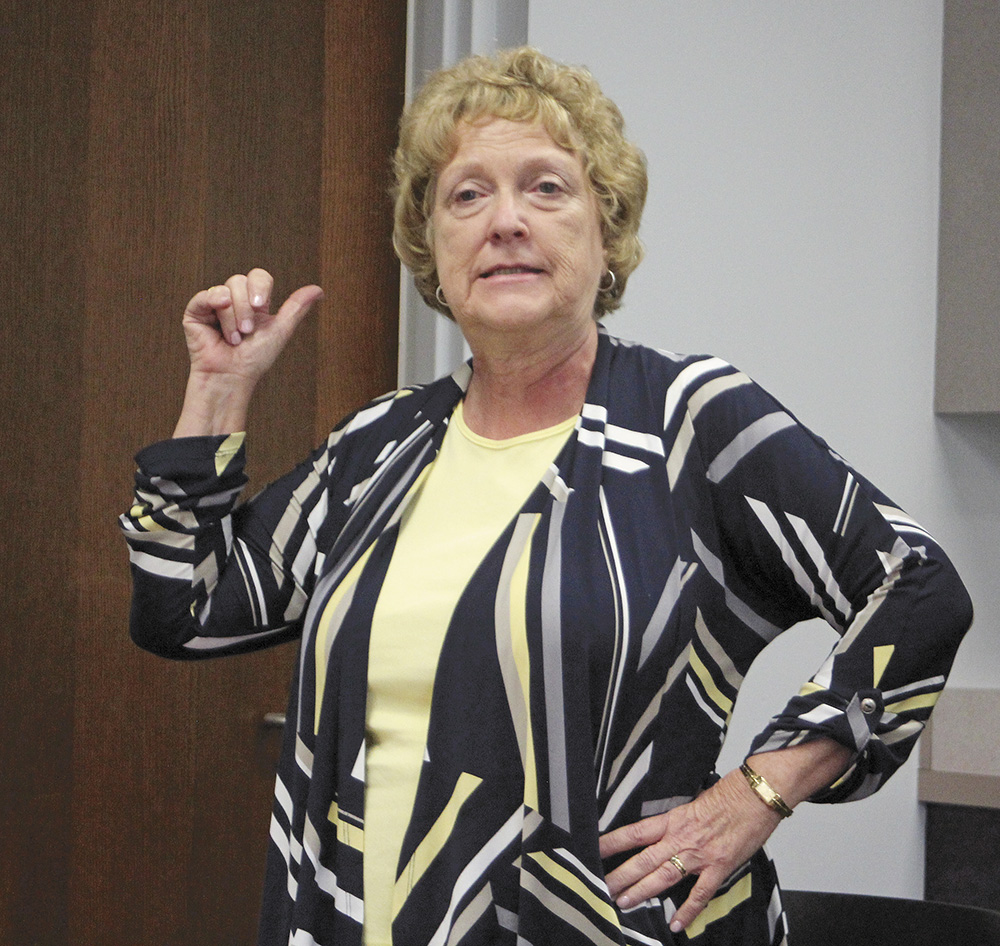Legislators get a lesson from retired teachers
By James Grob, jgrob@charlescitypress.com
Teachers spend a lot of their time urging their students to work together and get along.
So it shouldn’t have been a surprise to four Iowa state legislators when a group of retired educators told them the same thing on Wednesday.
“When we talk about teaching children how to get along, there’s a common good for the state, and everybody in Des Moines should be getting along for the common good, regardless of the party affiliation,” said one of the retired teachers. “I know there are philosophies on both sides, but the common good should always prevail.”
The legislators were Rep. Todd Prichard, D-Charles City; Sen. Waylon Brown, R-St. Ansgar; Sen. Amanda Ragan, D-Mason City; and Rep. Jane Bloomingdale, R-Northwood.
The event, held at Charles City’s NIACC location Wednesday, was a Q&A hosted by the Big 4 Unit of the Iowa Retired School Personnel Association (IRSPA).
The four talked about their legislative priorities and also took questions regarding expanded sports betting in Iowa, regulation of e-cigarette use, state environmental regulations and the bottle deposit recycling law, among other things.
The first question, however, was more of a statement from a retired teacher encouraging the legislators to do a better job of working together in Des Moines.
“I loved when you worked together, and I hate all the ‘R’ and the ‘D’ business,” the retired teacher said. “You’ve got to start with what we are promoting in our schools — we learn to work together. We’ve got to do it for our state, our country, our local places.”
Prichard said that the legislators in Des Moines actually do get along much better than what is portrayed by the media.
“The press always picks up on the tension and the controversy, because if they were going to write about us getting along, they’d be worried about selling newspapers,” he said. “We could do better, but we work together pretty well, for the most part.”
Prichard said that “95% of what we do is really pretty bipartisan,” and the other 5% is what makes the newspaper.
Brown pointed to an example of bipartisanship — Logan’s Law — which passed both houses unanimously last year.
Introduced by Brown and Prichard, the law requires the Iowa Department of Natural Resources to make it possible for persons getting Iowa hunting and fishing licenses to indicate their wish to be organ donors, similar to what is available on Iowa driver’s licenses. It also requires organ donor information in hunting safety courses.
“That’s a great example of some of the positive things we can do when we work together,” Brown said. “I was grateful to be able to be a part of that.”
Brown said that ushering the law through the Iowa Senate was a highlight for him last session.
“Probably, in my short time in the Legislature, that’s been the most meaningful piece of legislation I’ve been able to be a part of,” he said. “I’m really hopeful that becomes a national trend. I believe it has the legs to do that.”
Brown, who won his seat in 2016, represents the 26th Iowa Senate District which includes Floyd, Worth, Chickasaw, Howard, Mitchell and parts of Cerro Gordo and Winneshiek counties. He serves on the transportation, agriculture, labor business, commerce and ways and means committees, and also the Iowa Senate rules committee.
Prichard represents Iowa House District 52, which consists of Floyd, Chickasaw and the eastern third of Cerro Gordo counties. He was chosen to replace Mark Smith of Marshalltown as minority leader when the House Democratic caucus met before last year’s legislative session began. As Iowa House Minority Leader, he doesn’t sit on any committees, but instead assigns legislators to committees.
Ragan has served in the Iowa Senate since 2002, and at one time her district covered Floyd County. In 2016 she was appointed Iowa Senate Democratic Whip. She serves the 27th district, composed of Butler, Cerro Gordo and Franklin counties.
“I miss you guys,” Ragan said. “I loved representing Floyd County. It’s a special place and always will be for me.”
Bloomingdale represents Iowa House District 51, which includes part of Howard, Mitchell, Worth and Winneshiek counties. She was first elected in 2016.
The legislators spent most of their time Wednesday talking about health care and education. Prichard expressed regret that the Legislature didn’t get more accomplished with health care last session.
“I feel like we just keep missing opportunities, and I’ll start with health care,” Prichard said. “Probably the biggest issue I hear about in the district is health care cost, and reimbursements for providers. Nursing homes, hospitals, ambulance services and others who provide health care services are not getting reimbursed enough for them to conduct business.”
Prichard described the privatization of Medicaid as a “burning ship” and pointed to the problems Chickasaw County is having maintaining its ambulance service, because “their reimbursement rate is not adequate to cover their cost.”
“Now we have this problem in Charles City with our hospital. We’re going to have a vote to allow the hospital to levy taxes,” Prichard said. “We wouldn’t have to do this if the state provided and maintained its share available through the reimbursements of Medicaid and these programs.”
Ragan said she’s seeing local rural hospitals and other medical services closing throughout the state.
“Floyd County, you’ve got a mess,” she said. “Part of is due to privatization, part of it is we just don’t have the population growth in this area. The privatization of health care is one of the worst things that’s happened in my time serving.”
Prichard said he hopes the Legislature can get something done next session.
“There is a direct correlation between privatization and revenues at the hospital,” he said. “When we privatized, they lost money, they lost revenue.”
“You have less care, less service, less accountability and you are paying out-of-state corporations for poorly administrating health care,” Ragan added.
On the topic of education, Bloomingdale said the Legislature was able to come together last session and extend the SAVE dollar, as well as work on transportation costs for rural schools.
“The SAVE dollar will help our schools with infrastructure improvement,” she said. “Rural schools are also now getting money per student for transportation costs.”
Prichard agreed that the state did a better job addressing school funding than it had in years past, but it wasn’t good enough.
“We came to an agreement sooner and we had a little bit more money,” he said. “From a funding standpoint, if you don’t have robust growth, your maintenance issues and those things catch up with you, and you can’t keep up. We can do better.”
Ragan said that limitations to the collective bargaining rights of state employees was a part of the reason local school districts were in a bind.
“I think it was a mistake that we changed the collective bargaining law,” she said. “It was meant as a benefit for the teachers because they could not strike. It was a bipartisan effort to make sense of how to negotiate.”
Prichard said that small towns and rural communities take the biggest hits when the state makes decisions like that.
“If we don’t protect the revenue streams for the state and make commitments for things like health care and education, we’re going to suffer more in rural and small town Iowa,” he said.










Social Share